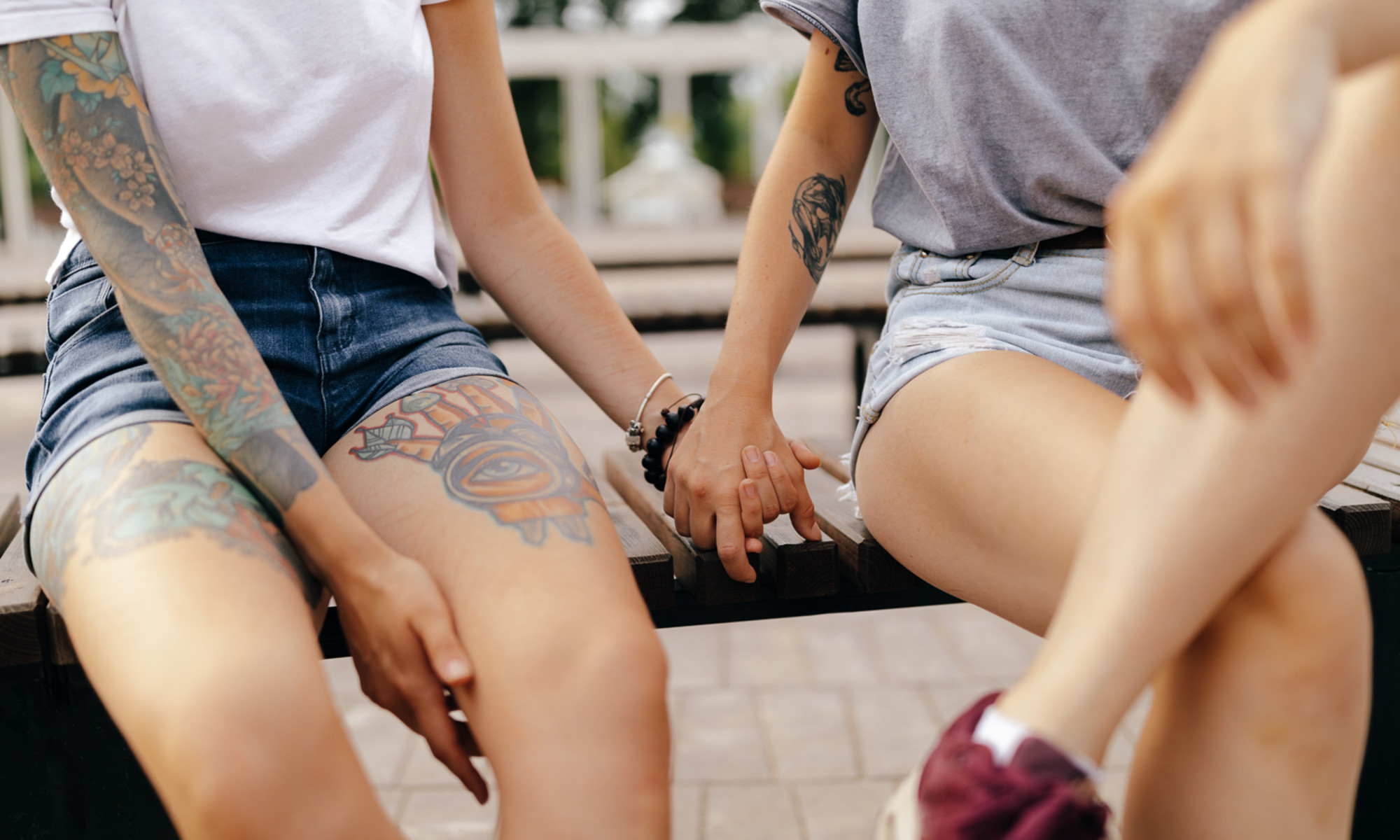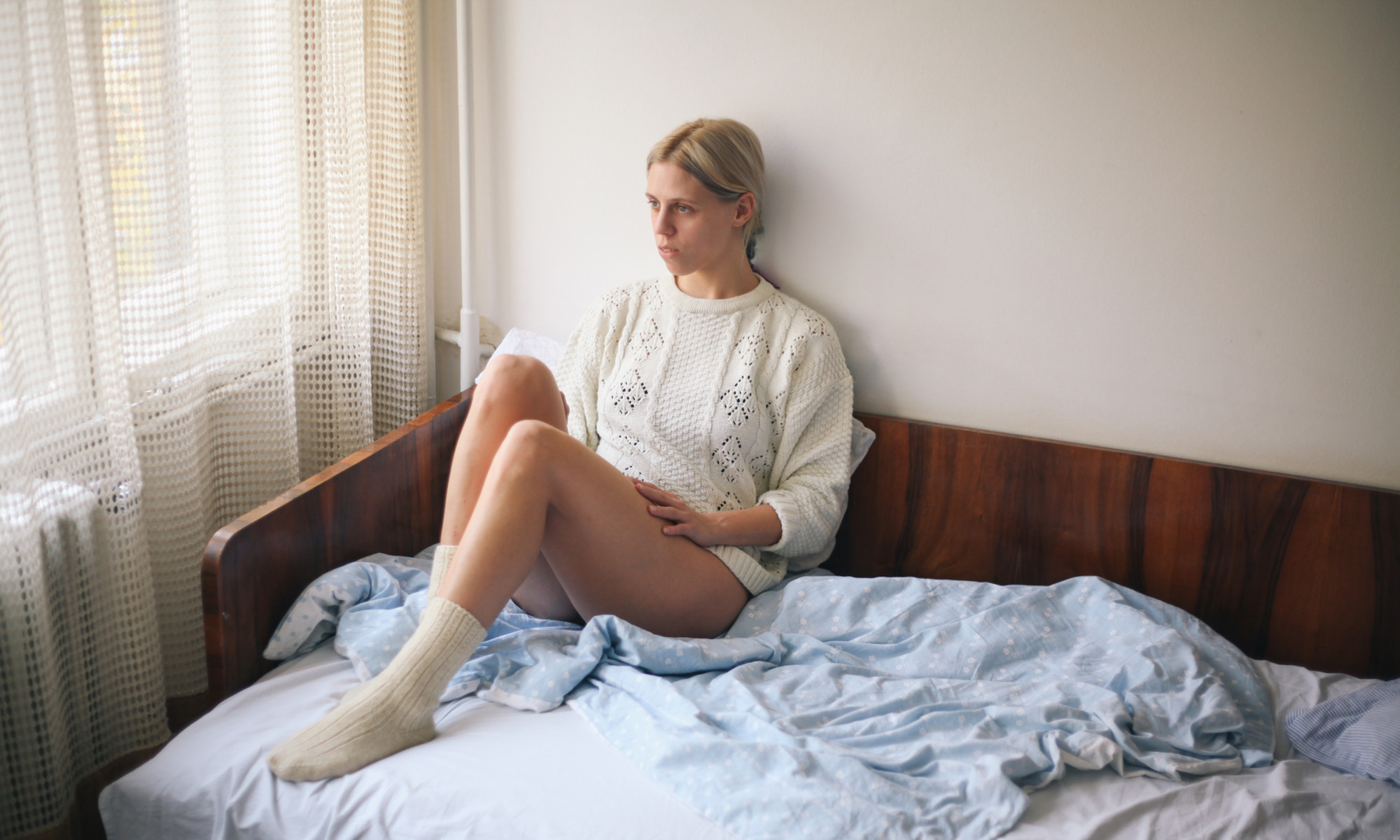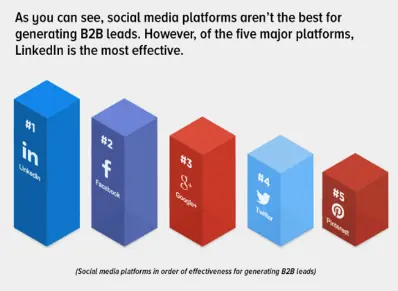Healing from Helene
How Buddhist centers in western North Carolina have responded to disaster The post Healing from Helene first appeared on Tricycle: The Buddhist Review. The post Healing from Helene appeared first on Tricycle: The Buddhist Review.
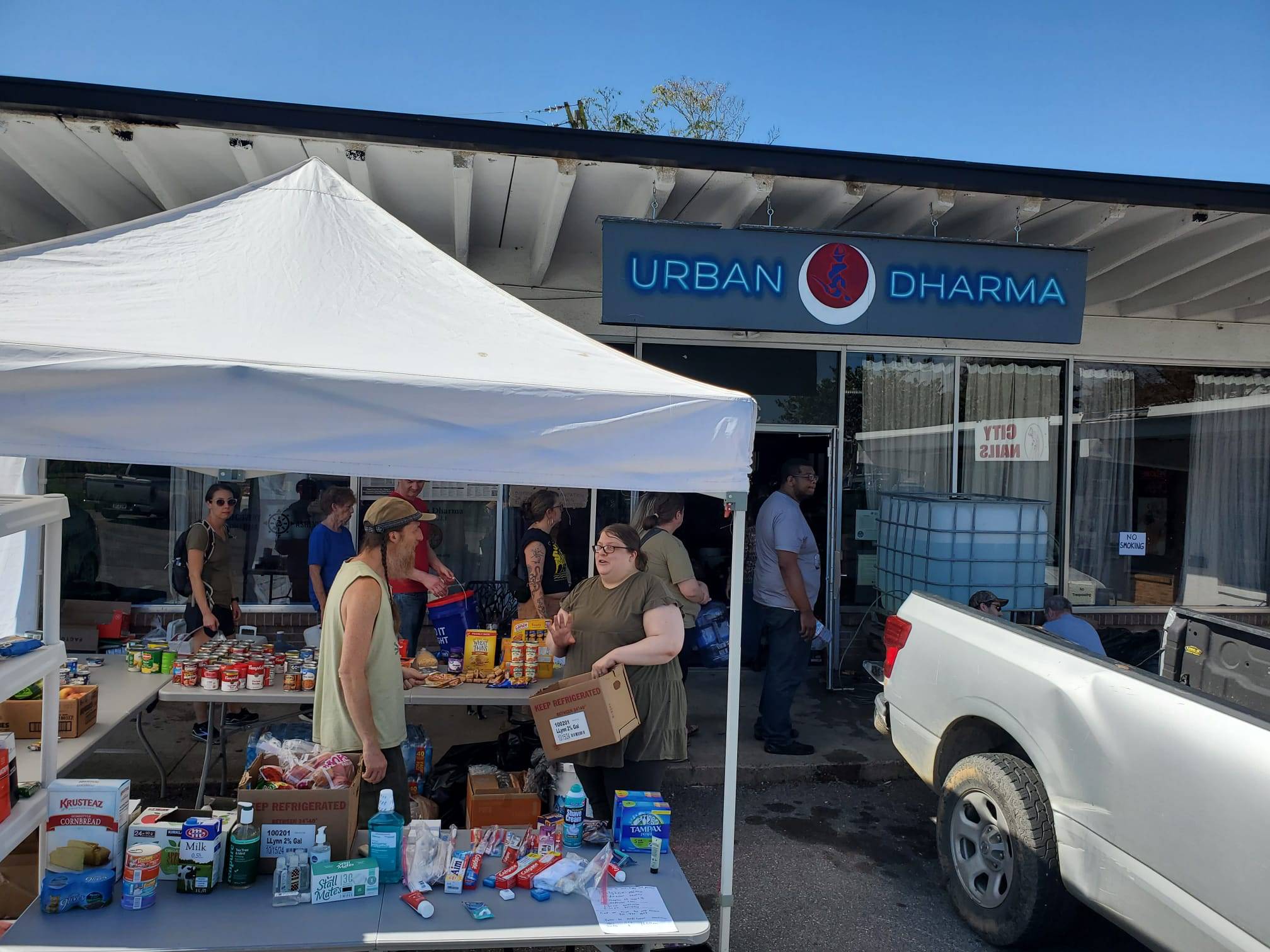
When Hurricane Helene changed course on September 27 and began heading toward western North Carolina, many residents of the mountainous area were unprepared for what was to come. After all, the region ranks “relatively low” on FEMA’s hurricane risk index and hasn’t been impacted by hurricane damage since Matthew, in 2016. But when news of the hurricane’s trajectory reached Karina Shevchenko of Asheville, she had an intuition that the storm was exceptional. “I lived in Tampa, Florida, for eighteen years, so I’ve experienced all the hurricanes,” she says. “But as night came, I could hear a roaring. That roaring. . . It was very abnormal. I had a bad feeling.” By the morning, she had no service, no water, and no power.
Beyond Shevchenko’s apartment, Helene’s historical flood waters left millions of residents and businesses without power, running water, or cell service. Rainfall upward of twenty inches over a three-day period was reported by the National Weather Service in towns such as Spruce Pine, Foscoe, and Hot Springs. Entire neighborhoods were washed away into rivers that rose dozens of feet above normal levels and tore through residential areas at rapid speeds. In North Carolina alone, 101 people were killed, and as of publication time, seven are still missing. Many of the dead were concentrated in Asheville’s Buncombe County.
 Asheville, United States. Debris clings to structures, marking the height of intense flooding after Hurricane Helene in Asheville, North Carolina, on October 2, 2024. | Photo by Madeleine Cook/FEMA/UPI Credit: UPI/Alamy Live News
Asheville, United States. Debris clings to structures, marking the height of intense flooding after Hurricane Helene in Asheville, North Carolina, on October 2, 2024. | Photo by Madeleine Cook/FEMA/UPI Credit: UPI/Alamy Live NewsShevchenko slowly learned the extent of the destruction at the nearby Moxy hotel, where she works part-time and where power was still on. Shevchenko’s first thought, post-storm, as a dedicated member of Urban Dharma—a nonsectarian Buddhist center situated in downtown Asheville— was to ensure that members of her sangha were unharmed. She tears up as she recalls her panic at being unable to contact Urban Dharma’s older members. At the Moxy, “people were talking about Black Mountain and Swannanoa being completely destroyed,” she says. “A lot of our community lives there. Being older, I was picturing them alone, not being able to get out of the way.” Eventually, Urban Dharma’s members and leaders were all accounted for with the help of spiritual director and founder Dr. Hun Lye, who was in Nepal at the time. Other local Buddhist centers weren’t so lucky.
Across town, at Anattasati Magga, a Zen temple in West Asheville, spiritual director and resident monastic Savana Amata Caroline Yongue was in the Sangha House during the storm when a number of trees fell on the house, with Yongue inside. “I was alone with my dog and cat, and the building is on the side of a mountain in the forest,” she says. “Every five minutes a tree would fall, and I kept thinking ‘Okay, the next tree is going to fall on me.’”
The next day, with no power or water, Yongue set up an office in her car. “I would sit in my car with my dog and charge my phone, answering emails and texts and listening to NPR. That’s how I learned about the devastation everywhere,” she says. As her concern for the community rose, she began getting visits from both sangha members and employees of Carolina Memorial Sanctuary (CMS), an interreligious conservation green burial cemetery founded by Anattasati Magga. One person Yongue hadn’t heard from at that point was CMS’s operations manager, Alison Wisely. In fact, it took nearly a full week for Yongue to learn that Wisely, along with her fiancé, Knox Petrucci, and two young sons, Felix and Lucas, had tragically drowned in the Toe River while trying to flee their Green Mountain home.
The loss of Wisely and her family has been felt keenly by all of those at CMS. Many of the younger staff members have never known anyone who has died so tragically. For Yongue, being a Zen teacher, death doula, and the director of the Center for End of Life Transitions and CMS, the grief is not new but still deep. “I know death,” she says tearfully. “I’ve been working on death stuff for decades. But it’s so tender, because I also know and love Alison. I know her children . . . they’re all in my heart.” In an effort to rally support around Wisely and Petrucci’s families and friends, Anattasati Magga called on the greater sangha and WNC community for help to cover funeral costs for all four. In addition, $70,000 was raised by Alison’s friends to support her parents, her son’s father, and Knox’s family. The family was buried at CMS on November 9, the day that Wisely and Petrucci were planning to wed.
Back at the sangha house, a few days after the storm, a number of groups showed up to assist Anattasati Magga with their tree damage. Firestorm Books, a radical anticapitalist bookstore situated nearby, organized a collective of young people for pop-up community support. When the group got wind of the temple’s situation, it took one day for fifteen volunteers and an arborist to show up at the temple. Monastics from the Great Tree Zen Women’s Temple in Alexander brought food and water. Next-door neighbors made visits to the temple to check on Yongue. “The coming together of all these people—who don’t really know each other—to create this word-of-mouth system and help so many people, it’s just amazing,” she says.
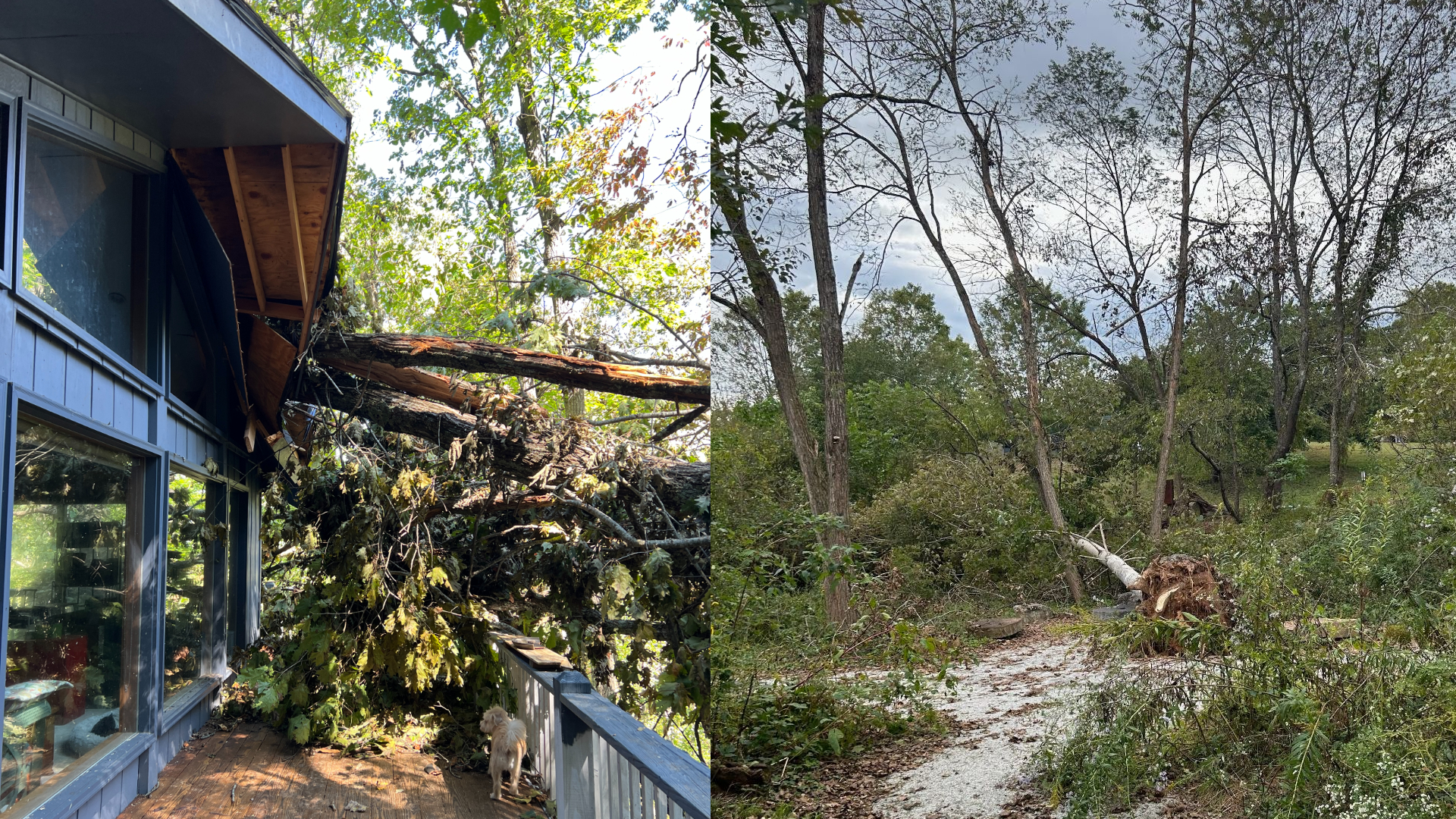 Felled trees at Annattasati Magga’s sangha house (left) and at Carolina Memorial Sanctuary (right) | Photos courtesy of Caroline Yongue
Felled trees at Annattasati Magga’s sangha house (left) and at Carolina Memorial Sanctuary (right) | Photos courtesy of Caroline YongueSouthern Dharma Retreat Center in Hot Springs also quickly developed a robust disaster relief system in the days following Helene. When news of the storm’s trajectory arrived at the center, it was in the midst of hosting a number of self-guided programs and an experienced practitioner retreat with Donald Rothberg. Staff members prepared retreatants for a relatively manageable weather event. “There really wasn’t a lot of consciousness around how dramatic the impact would be,” says Sonia Marcus, director of Southern Dharma. After the night of September 28, some retreatants found themselves stranded at the center, and one—who had flown in for the retreat from New York—at Marcus’s home in Asheville.
Completely unable to communicate or see one another in person, Southern Dharma’s staff and some retreatants began organizing community assistance independently in those first post-Helene days. “I had no idea what was going on at the retreat center, nor did they have any idea what was going on with me in Asheville,” Marcus says. “We were all sort of using our best judgment about how to spend our time.” In Hot Springs, staff members joined relief efforts at the nearby Spring Creek Community Center. In Asheville, Marcus joined the wave of residents engaging in mutual aid work—setting up tables of supplies, propane heaters, and food stations in their front yards. One of the first things she remembers seeing is “people bringing out grills and inviting people to bring their food, because all the food was spoiling without refrigeration and no one could cook.”
By the time cell service returned, everyone at Southern Dharma combined their organizing efforts into one multifaceted machine. Keith Felicity and Nata Davis-Reed focused their attention on Hot Springs and Spring Creek, going door to door with supplies. Lizeth Sanchez, a native of Mexico, began reaching out to Spanish-speaking communities that were particularly isolated and struggling to access relief. Marcus and Vanessa Moss spearheaded Asheville-area relief, temporarily joining forces with local parish Oasis Church to create a supply store and community space.
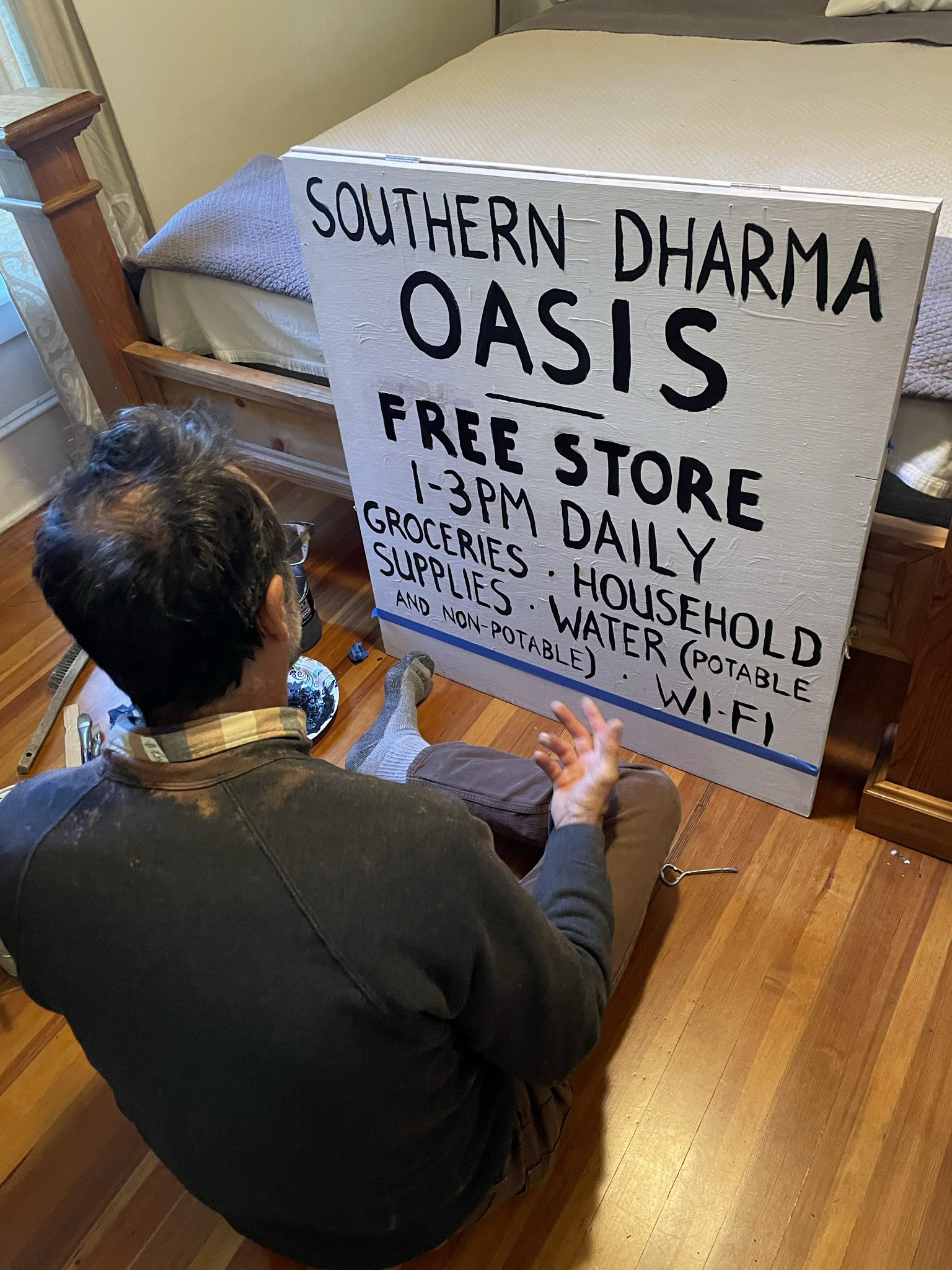 A Southern Dharma volunteer paints a sign for Southern Dharma Oasis. | Photo courtesy of Southern Dharma
A Southern Dharma volunteer paints a sign for Southern Dharma Oasis. | Photo courtesy of Southern DharmaWhile unconventional, the coming together of a Southern Baptist church and Buddhist organization under the same roof seemed to answer the needs of both groups. Southern Dharma needed a more centralized location, and Oasis, with a smaller and older congregation, needed an active group to fill up the empty wing of their building. “When we thanked them for the space for the umpteenth time, they told us that we were the answer to their prayers,” Marcus says. But even relief efforts are not without their own complications. As weeks passed, some locals and congregation members began to express discomfort surrounding Southern Dharma’s presence and iconography at Oasis Church, with some going as far as engaging in online harassment and even physical intimidation. As Southern Dharma staff began feeling worried about their safety, and leadership began to clash, the Southern Dharma board made the controversial decision to cease their operations with Oasis immediately, a decision that highlights a rift between Southern Dharma leaders and the organization’s board. The organization has been working since then to mend relationships and chart a way forward with compassion and care for its staff and community.
“The coming together of all these people—who don’t really know each other—to create this word-of-mouth system and help so many people, it’s just amazing.”
The aforementioned Urban Dharma, who temporarily joined forces with Southern Dharma while Oasis was still open, employed their own dedicated group of volunteers to help with relief efforts. Shevchenko of UD, out of work due to hurricane damage, stepped up to take on much of the initial work. Her first priorities were finding potable water, gas, and hygiene products. “I called a bunch of my friends and asked if they could come out to help. They were all not working and wanted to help the city, so we all started gathering items together,” she says. This group of word-of-mouth volunteers drove all over the state to find resources, and dropped them off at Urban Dharma’s center in Asheville. Other members of Urban Dharma delivered supplies to hard-hit remote areas in Mitchell County. They also delivered a $1,000 donation check to the Bradshaw (Volunteer) Fire and Rescue Department, whose fire hall and parking lot served as a major distribution center and medical clinic for their community. “Upon delivering the check, the staffer was so gracious, she insisted on getting the fire chief and assistant fire chief, who came out and personally thanked us and said this would be a great help,” says Bill Laity, Urban Dharma’s treasurer.
For Shevchenko, the practical elements of volunteering and serving the community with Urban Dharma have been tiring but worth it. “Being out of work for a month has been difficult, but I would much rather see people thrive,” Shevchenko says. The spiritual burden, on the other hand, has been heavy. “For the first five days, we had a curfew at 7:30 p.m. I would get home every night and sit from 7:30 to midnight and do my practice over and over. It helped me stay strong through this, and continue my drive,” she says. On top of nightly practice sessions, Dr. Lye’s spiritual guidance for the sangha has been a constant source of support for Shevchenko. “I have to credit my teacher. I’ve been creating mental strength through Urban Dharma that has helped me take on a lot of these practices that I can apply through these tough times.”
 Left, a Southern Dharma volunteer organizes donated propane tanks. Right, Southern Dharma volunteers pack a car for delivery. | Photos courtesy of Southern Dharma
Left, a Southern Dharma volunteer organizes donated propane tanks. Right, Southern Dharma volunteers pack a car for delivery. | Photos courtesy of Southern DharmaAs western North Carolina continues to navigate grief and loss in the wake of Hurricane Helene, these local Buddhist centers aren’t slowing down their outreach. Thanks in part to donations from Buddhist organizations from all over the world, Southern Dharma raised over $175,000 for relief aid. Since shuttering their site at Oasis, Southern Dharma’s funds are now being directed toward assisting other local relief organizations and providing essentials for nearly forty local families. Urban Dharma will maintain their supply pantry indefinitely, and has hosted open sangha meetings oriented around post-hurricane recovery. Anattasati Magga is working on repairing their temple as well as Carolina Memorial Sanctuary in hopes to resume all services in the near future and to heal as a community.
In a newsletter to her sangha, Southern Dharma’s Board chair Nancy Wright reflects on the efforts of their organization, and the greater WNC Buddhist community:
“What I am seeing is the Dharma made manifest. It is not the serene, ethereal exchange of wisdom I had imagined. It is the messy, chaotic, and emotional response to suffering. It is the realization that the warm hand that gives is no different than the warm hand that receives.”
♦
If you would like to donate to any of the centers mentioned in this article:
Hurricane Helene Disaster Relief Fund at Southern Dharma
Anattasati Magga Donation Page
Carolina Memorial Sanctuary Donation Page
Other donation pages:

 MikeTyes
MikeTyes 







